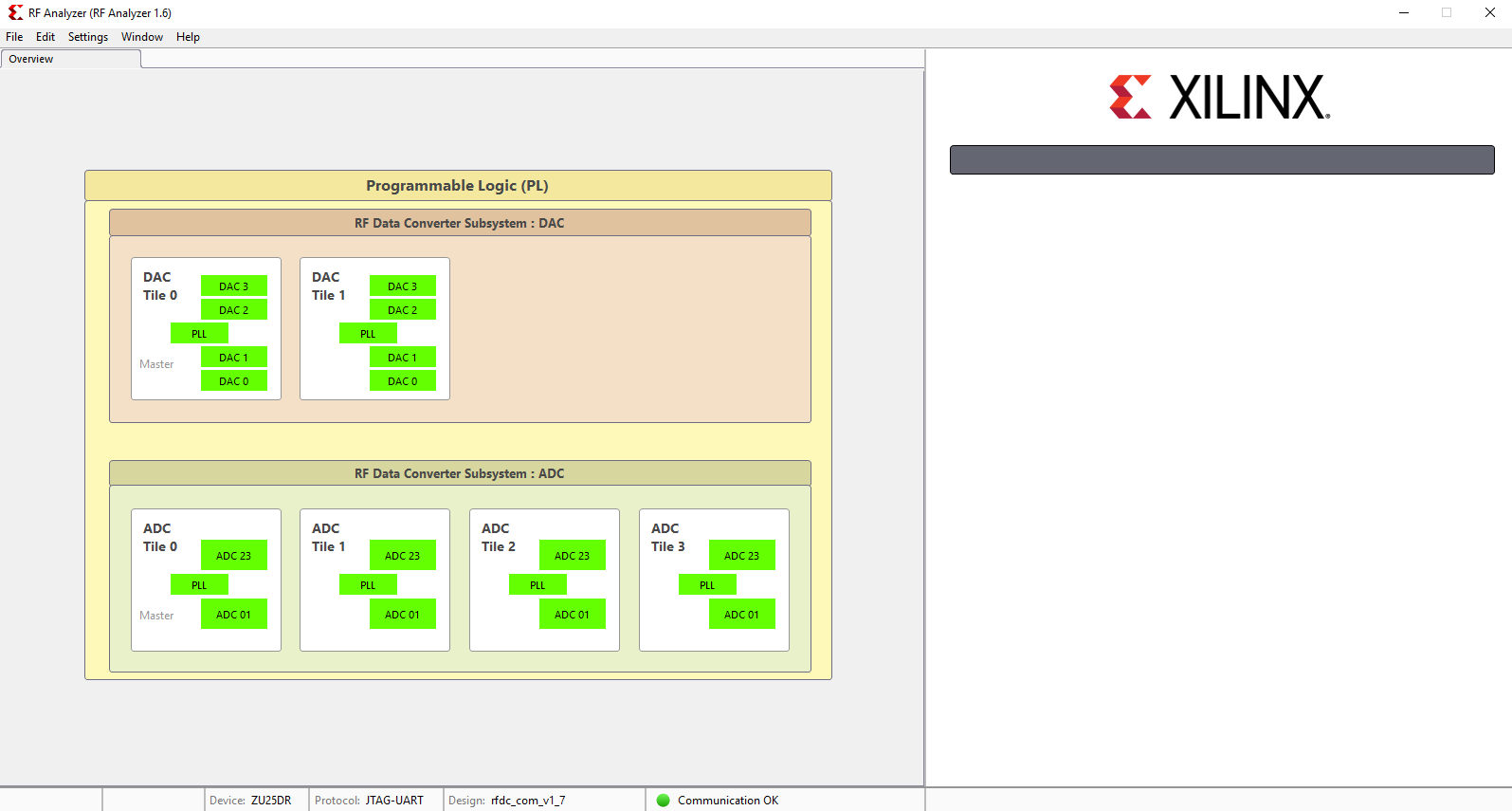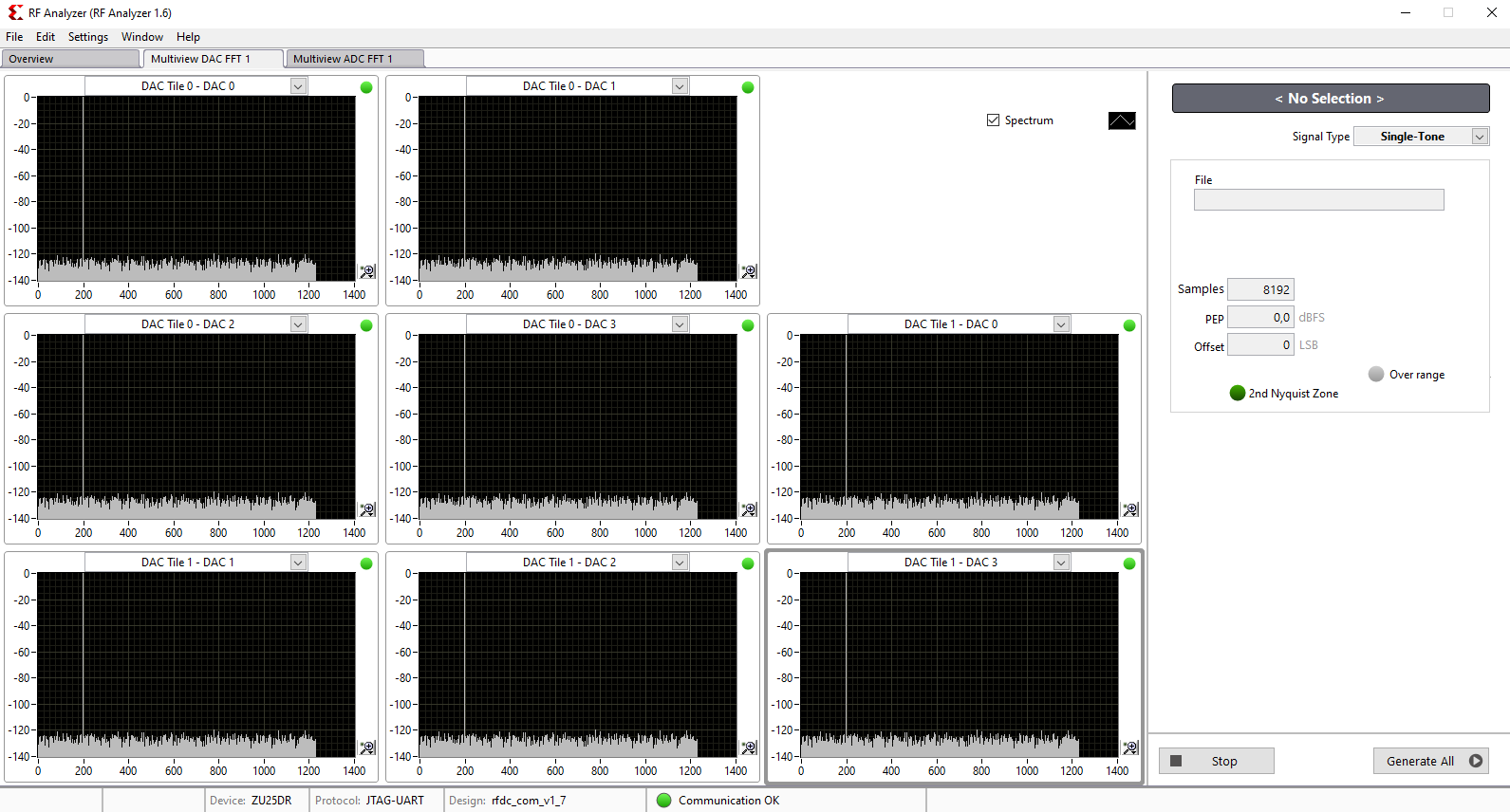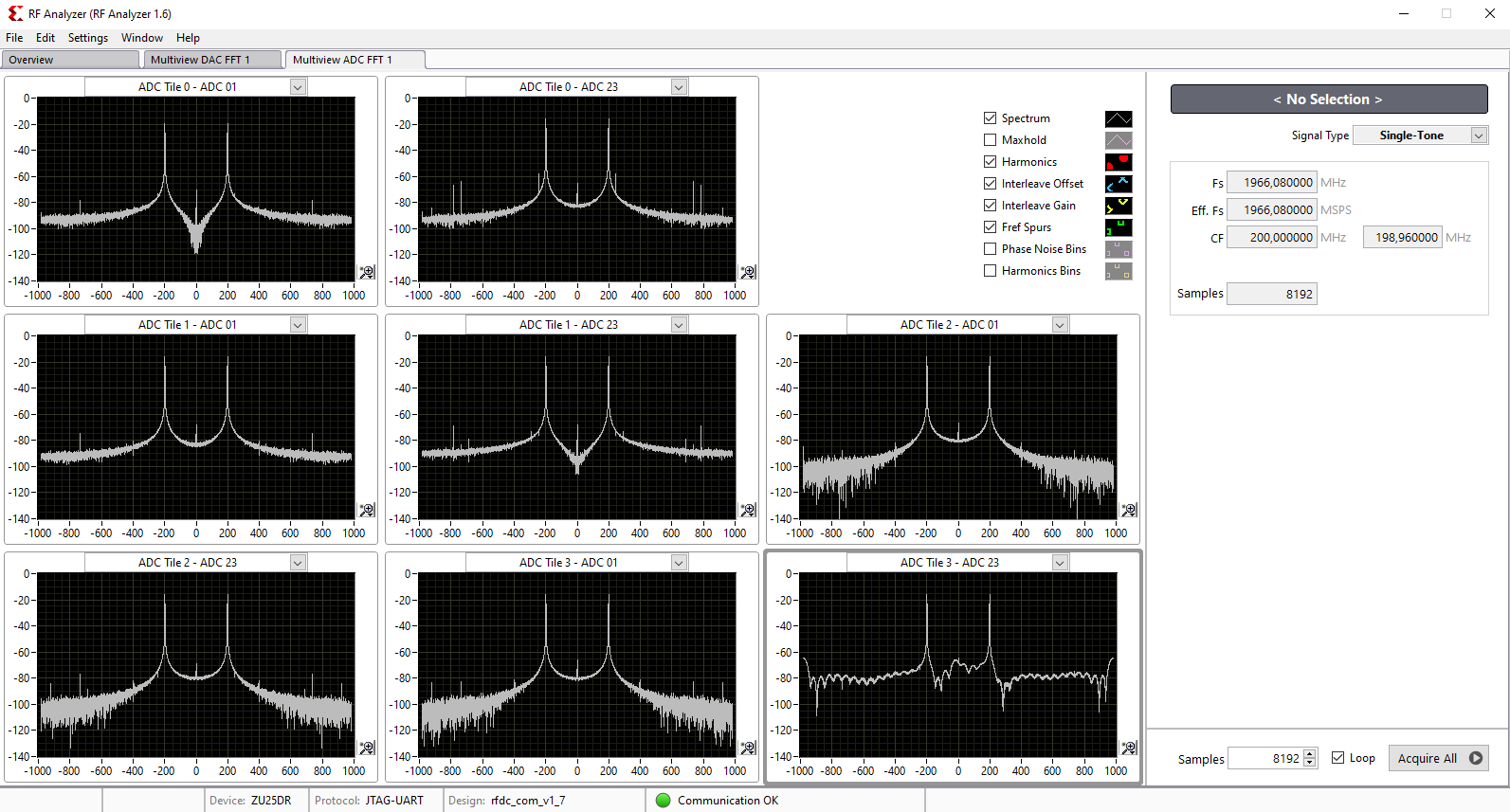Versions Compared
Key
- This line was added.
- This line was removed.
- Formatting was changed.
| Page properties | ||||||||||||
|---|---|---|---|---|---|---|---|---|---|---|---|---|
| ||||||||||||
Template Revision 3.0 Design Name is always "TE Series Name" + Design name, for example "TE0720 Test Board"
| ||||||||||||
| Page properties | ||||||||||||
| ||||||||||||
| Scroll Title | ||||||||||||
|
| Scroll Ignore |
|---|
Create DrawIO object here: Attention if you copy from other page, use |
| Scroll Only |
|---|
image link to the generate DrawIO PNG file of this page. This is a workaround until scroll pdf export bug is fixed |
Table template:
- Layout macro can be use for landscape of large tables
- Set column width manually(can be used for small tables to fit over whole page) or leave empty (automatically)
| anchor | Table_xyz |
|---|---|
| title | Text |
| Scroll Table Layout | ||||||||||||
|---|---|---|---|---|---|---|---|---|---|---|---|---|
|
Overview
| Page properties | ||||
|---|---|---|---|---|
| ||||
Notes :
|
Refer to http://trenz.org/te0xyz-info for the current online version of this manual and other available documentation.
Key Features
|
| Custom_table_size_100 |
|---|
| Page properties | ||||
|---|---|---|---|---|
| ||||
Notes Important General Note:
|
| Excerpt |
|---|
|
Revision History
| ||||||||||||||||||||||||||||||||||||||
| Page properties | ||||||||||||||||||||||||||||||||||||||
|---|---|---|---|---|---|---|---|---|---|---|---|---|---|---|---|---|---|---|---|---|---|---|---|---|---|---|---|---|---|---|---|---|---|---|---|---|---|---|
| ||||||||||||||||||||||||||||||||||||||
Notes :
| DRH
| Design Revision History
| Project Built | Authors | Description | |||||||||||||||||||||||||||||||||
| 2020-10-27 | 2019.2 | TE0835-test_board_noprebuilt-vivado_2019.2-build_15_20201027100145.zip | Mohsen Chamanbaz |
|
|
Overview
| Scroll Ignore | ||||||||||||||
|---|---|---|---|---|---|---|---|---|---|---|---|---|---|---|
| ||||||||||||||
| Page properties | ||||||||||||
|---|---|---|---|---|---|---|---|---|---|---|---|---|
| ||||||||||||
Notes : | ||||||||||||
| Scroll Title | ||||||||||||
|
| Scroll Table Layout | ||||||||||||
|---|---|---|---|---|---|---|---|---|---|---|---|---|
|
- It is recommended to reprogram and initialize the boad again if such situation happens.
Requirements
Software
|
Refer to http://trenz.org/te0835-info for the current online version of this manual and other available documentation.
Key Features
| Page properties | ||||
|---|---|---|---|---|
| ||||
Notes :
|
| Excerpt |
|---|
|
Revision History
| Page properties | ||||
|---|---|---|---|---|
| ||||
Notes :
|
| Scroll Title | |||||||||||||||||||||||||||||
|---|---|---|---|---|---|---|---|---|---|---|---|---|---|---|---|---|---|---|---|---|---|---|---|---|---|---|---|---|---|
| |||||||||||||||||||||||||||||
|
|
Release Notes and Know Issues
| Page properties | ||||
|---|---|---|---|---|
| ||||
Notes :
|
Basic description of TE Board Part Files is available on TE Board Part Files.
Complete List is available on <design name>/board_files/*_board_files.csv
Design supports following modules:
|
| Scroll Title | ||||||||||||||
|---|---|---|---|---|---|---|---|---|---|---|---|---|---|---|
| ||||||||||||||
| ||||||||||||||
| Module Model | Board Part Short Name | PCB Revision Support | DDR | QSPI Flash | EMMC | Others | Notes | |||||||
| TE0835-02-MXE21-A | 25dr_1e_4gb | REV2 | 4GB | 128MB | NA | NA | NA |
Design supports following carriers:
|
Requirements
Software
| Page properties | ||||
|---|---|---|---|---|
| ||||
Notes :
|
| Scroll Title | |||||||||||||||||
|---|---|---|---|---|---|---|---|---|---|---|---|---|---|---|---|---|---|
| |||||||||||||||||
|
Additional HW Requirements:
|
Hardware
| Page properties | ||||
|---|---|---|---|---|
| ||||
Notes :
|
Basic description of TE Board Part Files is available on TE Board Part Files.
Complete List is available on <design name>/board_files/*_board_files.csv
Design supports following modules:
| Scroll Title | ||||||||||||||
|---|---|---|---|---|---|---|---|---|---|---|---|---|---|---|
| ||||||||||||||
| ||||||||||||||
| Scroll Title | ||||||||||||||
| ||||||||||||||
| ||||||||||||||
| Additional Hardware | Notes | Micro USB Cable for JTAG/UART | ||||||||||||
| Cooler | It is strongly recommended that the RFSoC should not be used without heat sink. | |||||||||||||
| SMA male connector cable | Some ADC inputs/DAC outouts have the SMA connector | |||||||||||||
| UFL female connector cable | Some ADC inputs/DAC outouts have the UFL connector | Ethernet cable | ||||||||||||
| SD card | 16GB | |||||||||||||
| Signal generator (optional) | To feed a desired signal to the input of ADC | |||||||||||||
| Oscilloscope (optional) | To monitor the output signal of DACs. | |||||||||||||
| PC | With ATX Power supply and PCIe X8 slot |
Content
| Page properties | ||||
|---|---|---|---|---|
| ||||
Notes :
|
For general structure and of the reference design, see Project Delivery - Xilinx devices
Design Sources
*used as reference |
Design supports following carriers:
| Scroll Title | ||||||||||||||||||||||
|---|---|---|---|---|---|---|---|---|---|---|---|---|---|---|---|---|---|---|---|---|---|---|
| ||||||||||||||||||||||
*used as reference |
Additional HW Requirements:
| Scroll Title | ||||||||||||||||||||||||||
|---|---|---|---|---|---|---|---|---|---|---|---|---|---|---|---|---|---|---|---|---|---|---|---|---|---|---|
| ||||||||||||||||||||||||||
|
Additional Sources
| anchor | Table_ADS |
|---|---|
| title | Additional design sources |
| Scroll Table Layout | ||||||||||||
|---|---|---|---|---|---|---|---|---|---|---|---|---|
|
*used as reference |
Content
| Page properties | ||||
|---|---|---|---|---|
| ||||
Notes :
|
For general structure and of the reference design, see Project Delivery - Xilinx devices
Design Sources
Prebuilt
| Page properties | ||||||||||||||||||||||||||
|---|---|---|---|---|---|---|---|---|---|---|---|---|---|---|---|---|---|---|---|---|---|---|---|---|---|---|
| ||||||||||||||||||||||||||
| Scroll Title | ||||||||||||||||||||||||||
| PF
| Prebuilt files
| ||||||||||||||||||||||||
|
Additional Sources
| Scroll Title | ||||||||||||||||||||||||||||||
|---|---|---|---|---|---|---|---|---|---|---|---|---|---|---|---|---|---|---|---|---|---|---|---|---|---|---|---|---|---|---|
| ||||||||||||||||||||||||||||||
|
Prebuilt
| Page properties | ||||||||||||||||||||||||||||||||||||||||||||||||||||||||||||||||||||||||||||||||||||||||||||||||||||||||||||||||||||||||||||||||
|---|---|---|---|---|---|---|---|---|---|---|---|---|---|---|---|---|---|---|---|---|---|---|---|---|---|---|---|---|---|---|---|---|---|---|---|---|---|---|---|---|---|---|---|---|---|---|---|---|---|---|---|---|---|---|---|---|---|---|---|---|---|---|---|---|---|---|---|---|---|---|---|---|---|---|---|---|---|---|---|---|---|---|---|---|---|---|---|---|---|---|---|---|---|---|---|---|---|---|---|---|---|---|---|---|---|---|---|---|---|---|---|---|---|---|---|---|---|---|---|---|---|---|---|---|---|---|---|---|
| ||||||||||||||||||||||||||||||||||||||||||||||||||||||||||||||||||||||||||||||||||||||||||||||||||||||||||||||||||||||||||||||||
Notes :
| (only on ZIP with prebult content)
| Defines the necessary clock frequencies for the PLLs on the RFSoC module and carrier board |
Download
Reference Design is only usable with the specified Vivado/Vitis/PetaLinux version. Do never use different Versions of Xilinx Software for the same Project.
| Page properties | ||||
|---|---|---|---|---|
| ||||
|
Reference Design is available on:
Software Setup
Download RF Analyzer GUI from the following link and install it.
Design Flow
| Page properties | ||||
|---|---|---|---|---|
| ||||
Notes :
|
| Note |
|---|
Reference Design is available with and without prebuilt files. It's recommended to use TE prebuilt files for first lunch. |
Trenz Electronic provides a tcl based built environment based on Xilinx Design Flow.
See also:
The Trenz Electronic FPGA Reference Designs are TCL-script based project. Command files for execution will be generated with "_create_win_setup.cmd" on Windows OS and "_create_linux_setup.sh" on Linux OS.
TE Scripts are only needed to generate the vivado project, all other additional steps are optional and can also executed by Xilinx Vivado/SDK GUI. For currently Scripts limitations on Win and Linux OS see: Project Delivery - Xilinx devices
- _create_win_setup.cmd/_create_linux_setup.sh and follow instructions on shell:
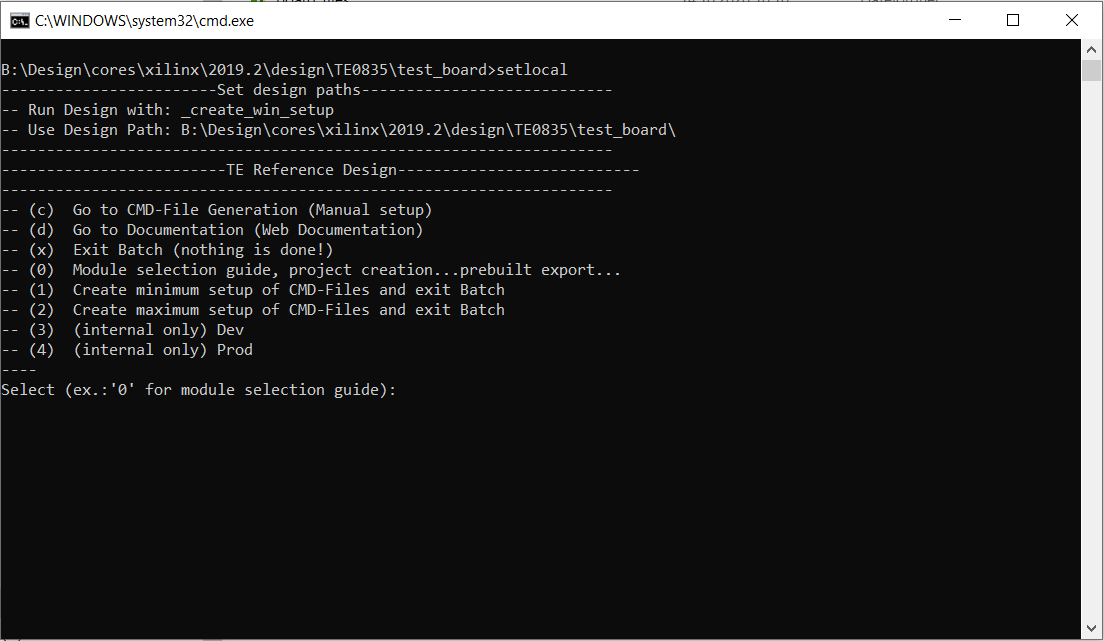 Image Removed
Image Removed - Press 0 and enter to start "Module Selection Guide"
- (optional Win OS) Generate Virtual Drive or use short directory for the reference design (for example x:\<design name>)
- Create Project (follow instruction of the product selection guide), settings file will be configured automatically during this process)
- (optional for manual changes) Select correct device and Xilinx install path on "design_basic_settings.cmd" and create Vivado project with "vivado_create_project_guimode.cmd"
Note: Select correct one, see also TE Board Part Files
- (optional for manual changes) Select correct device and Xilinx install path on "design_basic_settings.cmd" and create Vivado project with "vivado_create_project_guimode.cmd"
- Create XSA and export to prebuilt folder
- Run on Vivado TCL: TE::hw_build_design -export_prebuilt
Note: Script generate design and export files into \prebuilt\hardware\<short dir>. Use GUI is the same, except file export to prebuilt folder
- Run on Vivado TCL: TE::hw_build_design -export_prebuilt
- Create Linux (bl31.elf, uboot.elf and image.ub) with exported XSA
- XSA is exported to "prebuilt\hardware\<short name>"
Note: HW Export from Vivado GUI create another path as default workspace. - Create Linux images on VM, see PetaLinux KICKstart
- Use TE Template from /os/petalinux
- XSA is exported to "prebuilt\hardware\<short name>"
- Add Linux files (bl31.elf, uboot.elf and image.ub) to prebuilt folder
- "prebuilt\os\petalinux\<ddr size>" or "prebuilt\os\petalinux\<short name>"
- Generate Programming Files with Vitis
- Run on Vivado TCL: TE::sw_run_vitis -all
Note: Scripts generate applications and bootable files, which are defined in "sw_lib\apps_list.csv" - (alternative) Start SDK with Vivado GUI or start with TE Scripts on Vivado TCL: TE::sw_run_vitis
Note: TCL scripts generate also platform project, this must be done manuelly in case GUI is used. See Vitis
- Run on Vivado TCL: TE::sw_run_vitis -all
Launch
| Page properties | ||||
|---|---|---|---|---|
| ||||
Note:
|
Programming
| Note |
|---|
Check Module and Carrier TRMs for proper HW configuration before you try any design. |
Xilinx documentation for programming and debugging: Xilinx Development Tools
Get prebuilt boot binaries
|
| Scroll Title | |||||||||||||||||||||||||||||||||||||||||||||||
|---|---|---|---|---|---|---|---|---|---|---|---|---|---|---|---|---|---|---|---|---|---|---|---|---|---|---|---|---|---|---|---|---|---|---|---|---|---|---|---|---|---|---|---|---|---|---|---|
| |||||||||||||||||||||||||||||||||||||||||||||||
|
Download
Reference Design is only usable with the specified Vivado/Vitis/PetaLinux version. Do never use different Versions of Xilinx Software for the same Project.
| Page properties | ||||
|---|---|---|---|---|
| ||||
|
Reference Design is available on:
Software Setup
Download RF Analyzer GUI from the following link and install it.
Design Flow
| Scroll Ignore | ||||||||||||||
|---|---|---|---|---|---|---|---|---|---|---|---|---|---|---|
| ||||||||||||||
| Page properties | ||||
|---|---|---|---|---|
| ||||
Notes :
|
| Note |
|---|
Reference Design is available with and without prebuilt files. It's recommended to use TE prebuilt files for first lunch. |
Trenz Electronic provides a tcl based built environment based on Xilinx Design Flow.
See also:
The Trenz Electronic FPGA Reference Designs are TCL-script based project. Command files for execution will be generated with "_create_win_setup.cmd" on Windows OS and "_create_linux_setup.sh" on Linux OS.
TE Scripts are only needed to generate the vivado project, all other additional steps are optional and can also executed by Xilinx Vivado/SDK GUI. For currently Scripts limitations on Win and Linux OS see: Project Delivery - Xilinx devices
| Note |
|---|
Caution! Win OS has a 260 character limit for path lengths which can affect the Vivado tools. To avoid this issue, use Virtual Drive or the shortest possible names and directory locations for the reference design (for example "x:\<project folder>") |
Run _create_win_setup.cmd/_create_linux_setup.sh and follow instructions on shell
- Press 0 and enter to start "Module Selection Guide"
- Select assembly version
- Validate selection
- Select Create and open delivery binary folder
Note: Folder (<project foler>/_binaries_<Artikel Name>) with subfolder (boot_<app name>) for different applications will be generated
QSPI
Optional for Boot.bin on QSPI Flash and image.ub on SD.
- Connect JTAG and power on carrier with module
- Open Vivado Project with "vivado_open_existing_project_guimode.cmd" or if not created, create with "vivado_create_project_guimode.cmd"
- Type on Vivado TCL Console: TE::pr_program_flash -swapp u-boot
Note: To program with SDK/Vivado GUI, use special FSBL (zynqmp_fsbl_flash) on setup
optional "TE::pr_program_flash -swapp hello_te0835" possible - Copy image.ub on SD-Card
- use files from (<project foler>/_binaries_<Articel Name>)/boot_linux from generated binary folder,see: Get prebuilt boot binaries
- or use prebuilt file location, see <design_name>/prebuilt/readme_file_location.txt
- Insert SD-Card
SD
- Copy image.ub and Boot.bin on SD-Card
- use files from (<project foler>/_binaries_<Articel Name>)/boot_linux from generated binary folder,see: Get prebuilt boot binaries
- or use prebuilt file location, see <design_name>/prebuilt/readme_file_location.txt
- Set Boot Mode to SD-Boot.
- Depends on Carrier, see carrier TRM.
- Insert SD-Card in SD-Slot.
JTAG
Not used on this Example.
Hardware Setup
The Hardware contains of a TE0835 module and TEB0835 carrier board and has 8 ADC inputs and 8 DAC outputs.
- Plug the TE0835 module on the TEB0835 carrier board
- Install the cooler on the RFSoC chip
- Attention: It is strongly recommended that the RFSoC should not be used without heat sink.
- Connect the micro USB cable to the J29 connector
- Plug the board on the PCIe port of the PC
- Plug the prepared SD card on the SD card socket (J28)
- Connect a cable with SMA or UFL connector to one of the DAC connector( for example DAC0 J9) and feed it back to the related ADC input (for example ADC0 J1)
- (optional) A signal generator can be used to feed desired sinal to ADC input.
- (optional) An oscilloscope can be used to monitor the output signal of DAC.
Usage
:
Code Block language bash theme Midnight title _create_win_setup.cmd/_create_linux_setup.sh ------------------------Set design paths---------------------------- -- Run Design with: _create_win_setup -- Use Design Path: <absolute project path> -------------------------------------------------------------------- -------------------------TE Reference Design--------------------------- -------------------------------------------------------------------- -- (0) Module selection guide, project creation...prebuilt export... -- (1) Create minimum setup of CMD-Files and exit Batch -- (2) Create maximum setup of CMD-Files and exit Batch -- (3) (internal only) Dev -- (4) (internal only) Prod -- (c) Go to CMD-File Generation (Manual setup) -- (d) Go to Documentation (Web Documentation) -- (g) Install Board Files from Xilinx Board Store (beta) -- (a) Start design with unsupported Vivado Version (beta) -- (x) Exit Batch (nothing is done!) ---- Select (ex.:'0' for module selection guide):- Press 0 and enter to start "Module Selection Guide"
- Createproject and follow instructions of the product selection guide, settings file will be configured automatically during this process.
optional for manual changes: Select correct device and Xilinx install path on "design_basic_settings.cmd" and create Vivado project with "vivado_create_project_guimode.cmd"
Note Note: Select correct one, see also Vivado Board Part Flow
Create hardware description file (.xsa file) for PetaLinux project and export to prebuilt folder
Code Block language py theme Midnight title run on Vivado TCL (Script generates design and export files into "<project folder>\prebuilt\hardware\<short name>") TE::hw_build_design -export_prebuiltInfo Using Vivado GUI is the same, except file export to prebuilt folder.
- Create and configure your PetaLinux project with exported .xsa-file, see PetaLinux KICKstart
- use TE Template from "<project folder>\os\petalinux"
use exported .xsa file from "<project folder>\prebuilt\hardware\<short name>" . Note: HW Export from Vivado GUI creates another path as default workspace.
The build images are located in the "<plnx-proj-root>/images/linux" directory
- Configure the boot.scr file as needed, see Distro Boot with Boot.scr
- Copy PetaLinux build image files to prebuilt folder
copy u-boot.elf, image.ub and boot.scr from "<plnx-proj-root>/images/linux" to prebuilt folder
Info "<project folder>\prebuilt\os\petalinux\<ddr size>" or "<project folder>\prebuilt\os\petalinux\<short name>"
Page properties hidden true id Comments This step depends on Xilinx Device/Hardware
for Zynq-7000 series
- copy u-boot.elf, image.ub and boot.scr from "<plnx-proj-root>/images/linux" to prebuilt folder
for ZynqMP
- copy u-boot.elf, bl31.elf, image.ub and boot.scr from "<plnx-proj-root>/images/linux" to prebuilt folder
for ...
- ...
Generate Programming Files with Vitis
Code Block language py theme Midnight title run on Vivado TCL (Script generates applications and bootable files, which are defined in "test_board\sw_lib\apps_list.csv") TE::sw_run_vitis -all TE::sw_run_vitis (optional; Start Vitis from Vivado GUI or start with TE Scripts on Vivado TCL)Note TCL scripts generate also platform project, this must be done manually in case GUI is used. See Vitis
Launch
| Scroll Ignore | ||||||||||||||
|---|---|---|---|---|---|---|---|---|---|---|---|---|---|---|
| ||||||||||||||
| Page properties | ||||
|---|---|---|---|---|
| ||||
Note:
|
Programming
| Note |
|---|
Check Module and Carrier TRMs for proper HW configuration before you try any design. Reference Design is also available with prebuilt files. It's recommended to use TE prebuilt files for first launch. |
Xilinx documentation for programming and debugging: Xilinx Development Tools
Get prebuilt boot binaries
- _create_win_setup.cmd/_create_linux_setup.sh and follow instructions on shell
- Press 0 and enter to start "Module Selection Guide"
- Select assembly version
- Validate selection
Select Create and open delivery binary folder
Info Note: Folder "<project folder>\_binaries_<Article Name>" with subfolder "boot_<app name>" for different applications will be generated
QSPI-Boot mode
Option for Boot.bin on QSPI Flash and image.ub and boot.scr on SD or USB.
- Connect JTAG and power on carrier with module
Open Vivado Project with "vivado_open_existing_project_guimode.cmd" or if not created, create with "vivado_create_project_guimode.cmd"
Code Block language py theme Midnight title run on Vivado TCL (Script programs BOOT.bin on QSPI flash) TE::pr_program_flash -swapp u-boot TE::pr_program_flash -swapp hello_te0820 (optional)Note To program with Vitis/Vivado GUI, use special FSBL (fsbl_flash) on setup
- Copy image.ub and boot.scr on SD or USB
- use files from "<project folder>\_binaries_<Article Name>\boot_linux" from generated binary folder,see: Get prebuilt boot binaries
- or use prebuilt file location, see "<project folder>\prebuilt\file_location.txt"
- Set Boot Mode to QSPI-Boot and insert SD or USB.
- Depends on Carrier, see carrier TRM.
SD-Boot mode
- Copy image.ub and Boot.bin on SD-Card
- use files from (<project foler>/_binaries_<Articel Name>)/boot_linux from generated binary folder,see: Get prebuilt boot binaries
- or use prebuilt file location, see <design_name>/prebuilt/readme_file_location.txt
- Set Boot Mode to SD-Boot.
- Depends on Carrier, see carrier TRM.
- Insert SD-Card in SD-Slot.
JTAG
Not used on this Example.
Hardware Setup
The Hardware contains of a TE0835 module and TEB0835 carrier board and has 8 ADC inputs and 8 DAC outputs.
- Plug the TE0835 module on the TEB0835 carrier board
- Install the cooler on the RFSoC chip
- Attention: It is strongly recommended that the RFSoC should not be used without heat sink.
- Connect the micro USB cable to the J29 connector
- Plug the board on the PCIe port of the PC
- Plug the prepared SD card on the SD card socket (J28)
- Connect a cable with SMA or UFL connector to one of the DAC connector( for example DAC0 J9) and feed it back to the related ADC input (for example ADC0 J1)
- (optional) A signal generator can be used to feed desired sinal to ADC input.
- (optional) An oscilloscope can be used to monitor the output signal of DAC.
Usage
- Prepare HW like described on section Hardware Setup
- Connect UART USB (most cases same as JTAG)
Select SD Card as Boot Mode (or QSPI - depending on step 1)
Info Note: See TRM of the Carrier, which is used.
Tip Starting with Petalinux version 2020.1, the industry standard "Distro-Boot" boot flow for U-Boot was introduced, which significantly expands the possibilities of the boot process and has the primary goal of making booting much more standardised and predictable.
The boot options described above describe the common boot processes for this hardware; other boot options are possible.
For more information see Distro Boot with Boot.scrPower On PCB
Expand title boot process 1. Zynqmp RFSoC Boot ROM loads FSBL from SD into OCM
2. FSBL loads U-boot from SD into DDR,
3. U-boot loads Linux (image.ub) from SD/QSPI/... into DDR
Page properties hidden true id Comments This step depends on Xilinx Device/Hardware
for Zynq-7000 series
1. Zynq Boot ROM loads FSBL from SD/QSPI into OCM,
2. FSBL init the PS, programs the PL using the bitstream and loads U-boot from SD/QSPI into DDR,
3. U-boot loads Linux (image.ub) from SD/QSPI/... into DDR
for ZynqMP???
1. ZynqMP Boot ROM loads FSBL from SD/QSPI into OCM,
2. FSBL init the PS, programs the PL using the bitstream and loads PMU, ATF and U-boot from SD/QSPI into DDR,
3. U-boot loads Linux (image.ub) from SD/QSPI/... into DDR
for Microblaze
1. FPGA Loads Bitfile from Flash,
2. MCS Firmware configure SI5338 and starts Microblaze,
3. SREC Bootloader from Bitfile Firmware loads U-Boot into DDR (This takes a while),
4. U-boot loads Linux from QSPI Flash into DDR
for native FPGA
...
- Prepare HW like described on section 111444625
- Connect UART USB (most cases same as JTAG)
- Select SD Card as Boot Mode (or QSPI - depending on step 1)
Note: See TRM of the Carrier, which is used. - Power On PCB
Note: 1. Zynqmp RFSoC Boot ROM loads FSBL from SD into OCM, 2. FSBL loads U-boot from SD into DDR, 3. U-boot load Linux from SD into DDR
Linux
- Open Serial Console (e.g. putty)
- Speed: 115200
select COM Port
Info Win OS, see device manager, Linux OS
see dmesg |grep
tty (UART is *USB1)
Linux Console:
Note: Wait until Linux boot finished For Linux Login use:Code Block language bash theme Midnight petalinux login: root Password:- User Name: root Password:
You can use Linux shell now.
- I2C Bus type: i2cdetect -y -r 0
- Bus 0 up to 5 possible
- RTC check: dmesg | grep rtc
- ETH0 works with udhcpc
- USB type "lsusb" or connect USB2.0 device PCIe Bus type: "lspci"PCIe device should be seen in the console
- Option Features
- Webserver to get access to Zynqmp RFSoC
- insert IP on web browser to start web interface
- init.sh scripts
- add init.sh script on SD, content will be load automatically on startup (template included in
- "<project folder>\misc\SD")
- "<project folder>\misc\SD")
- Webserver to get access to Zynqmp RFSoC
root |
| Code Block | ||||
|---|---|---|---|---|
| ||||
i2cdetect -y -r 0 (check I2C Bus; BUS 0 up to 5 possible)
dmesg | grep rtc (RTC check)
udhcpc (ETH0 check)
lsusb (USB check) |
Vivado HW Manager
| Page properties | ||||
|---|---|---|---|---|
| ||||
Note:
|
Open Vivado HW-Manager and add VIO signal to dashboard (*.ltx located on prebuilt folder)
- Monitoring:
- The output frequency of MMCM blocks can be monitored.
- Set radix from VIO signals to unsigned integer.
- The tempreature of ARM processor and FPGA can be measured too.
- The output frequency of MMCM blocks can be monitored.
| Scroll Title | ||||||
|---|---|---|---|---|---|---|
| ||||||
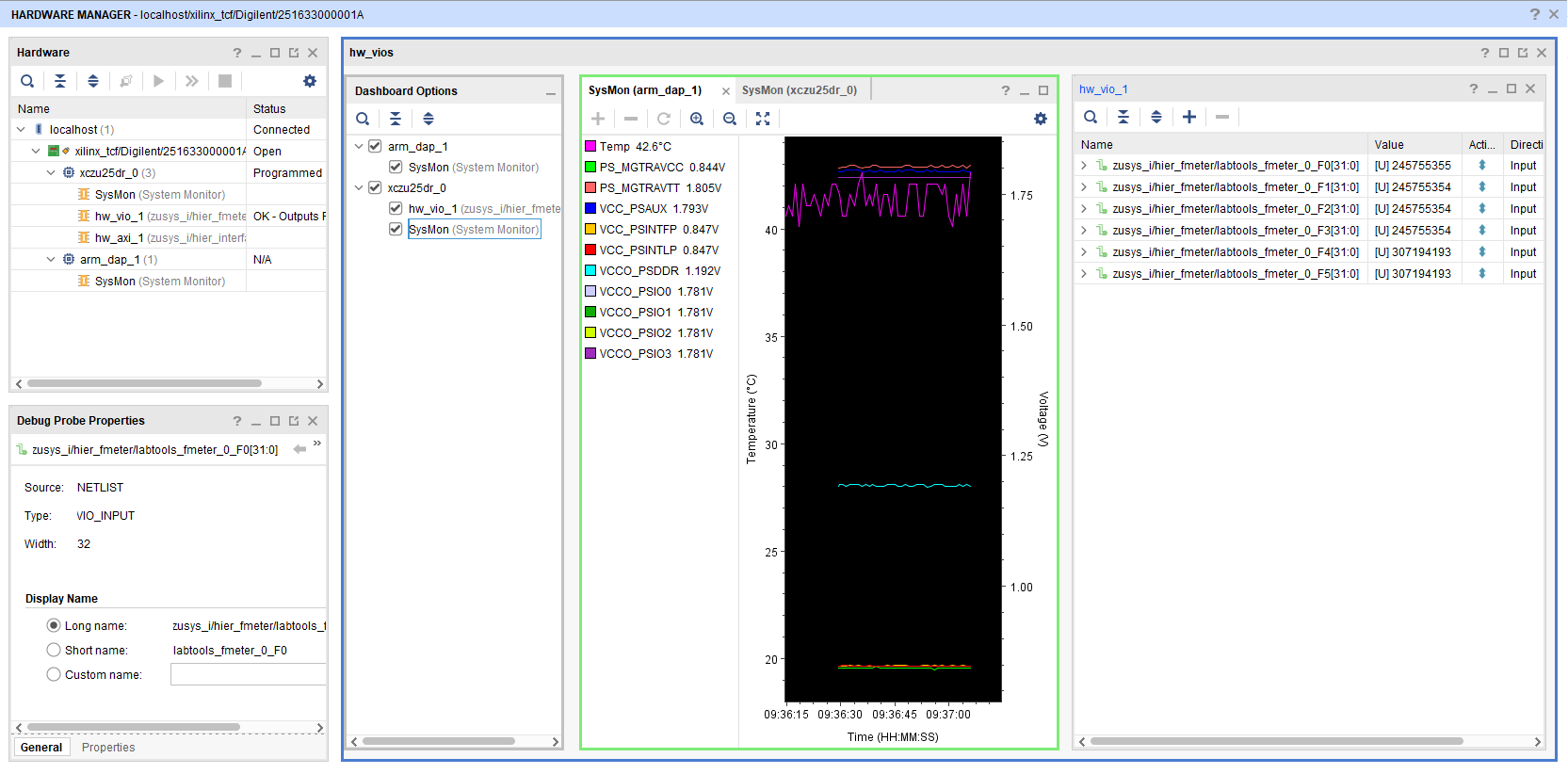 |
RF Analyzer
- Open the RF Analyzer GUI
- Click on Connect button
- Adjust the desired JTAG frequency (for example 30MHZ)
- Give the generated bitstream file path
- Click on Download Bitstream button to load the Bitstream file on the FPGA
- When downloading is finished, click on Select Target button
- After initilalisation, all ADCs/DACs tiles are visible
- Click on desired DAC tile and choose a DAC (for example DAC0)
- Adjust desired DAC properties (for example output frequency)
- Click on Generate button to generate the signal in output of DAC
- Click on the related ADC tile and choose the related ADC (for example ADC0)
- Click on Acquire button to aqcuire the input signal
- The spectum of the DAC output signal can be seen now. The signal can be visible in time domain too.
- Tip: In menu Window click on Multiview to see all of DACs and ADCs simultaneously.
| RF Analyzer GUI | Board TE0835 ( RFSoC U1) | TEB0835 | ||||
|---|---|---|---|---|---|---|
| Tile /Converter | SoC Pin Name | SoC Pin Number | B2B | Signal Name | Connector Designator | Connector Type |
| ADC Tile 0-ADC 01 | ADC0_P/ADC0_N | AK2/AK1 | 31/29 | ADC0_P/ADC0_N | J1 | SMA |
| ADC Tile 0-ADC 23 | ADC1_P/ADC1_N | AH2/AH1 | 43/41 | ADC1_P/ADC1_N | J2 | UFL |
| ADC Tile 1-ADC 01 | ADC2_P/ADC2_N | AF2/AF1 | 49/47 | ADC2_P/ADC2_N | J3 | SMA |
| ADC Tile 1-ADC 23 | ADC3_P/ADC3_N | AD2/AD1 | 59/61 | ADC3_P/ADC3_N | J4 | UFL |
| ADC Tile 2-ADC 01 | ADC4_P/ADC4_N | AB2/AB1 | 67/65 | ADC4_P/ADC4_N | J5 | SMA |
| ADC Tile 2-ADC 23 | ADC5_P/ADC5_N | Y2/Y1 | 79/77 | ADC5_P/ADC5_N | J6 | UFL |
| ADC Tile 3-ADC 01 | ADC6_P/ADC6_N | V2/V1 | 85/83 | ADC6_P/ADC6_N | J7 | SMA |
| ADC Tile 3-ADC 23 | ADC7_P/ADC7_N | T2/T1 | 97/95 | ADC7_P/ADC7_N | J8 | UFL |
| DAC Tile 0-DAC 0 | DAC0_P/DAC0_N | N2/N1 | 103/101 | DAC0_P/DAC0_N | J9 | SMA |
| DAC Tile 0-DAC 1 | DAC1_P/DAC1_N | L2/L1 | 109/107 | DAC1_P/DAC1_N | J10 | UFL |
| DAC Tile 0-DAC 2 | DAC2_P/DAC2_N | J2/J1 | 121/119 | DAC2_P/DAC2_N | J11 | SMA |
| DAC Tile 0-DAC 3 | DAC3_P/DAC3_N | G2/G1 | 127/125 | DAC3_P/DAC3_N | J12 | UFL |
| DAC Tile 1-DAC 0 | DAC4_P/DAC4_N | E2/E1 | 133/131 | DAC4_P/DAC4_N | J13 | UFL |
| DAC Tile 1-DAC 1 | DAC5_P/DAC5_N | C2/C1 | 139/137 | DAC5_P/DAC5_N | J14 | UFL |
| DAC Tile 1-DAC 2 | DAC6_P/DAC6_N | B4/A4 | 151/149 | DAC6_P/DAC6_N | J15 | UFL |
| DAC Tile 1-DAC 3 | DAC7_P/DAC7_N | B6/A6 | 157/155 | DAC7_P/DAC7_N | J16 | UFL |
As an example the GUi should be seen after initialization as below:
| Expand | ||
|---|---|---|
| ||
|
For example, when all DACs are in operation, the GUI can be seen as below:
| Expand | ||
|---|---|---|
| ||
|
For example, when all ADCs are in operation, the GUI can be seen as below:
| Expand | ||
|---|---|---|
| ||
|
System Design - Vivado
| Scroll Ignore | ||||||||||||||
|---|---|---|---|---|---|---|---|---|---|---|---|---|---|---|
| ||||||||||||||
| Page properties | ||||
|---|---|---|---|---|
| ||||
Note:
|
Block Design
| Scroll Title | ||||||
|---|---|---|---|---|---|---|
| ||||||
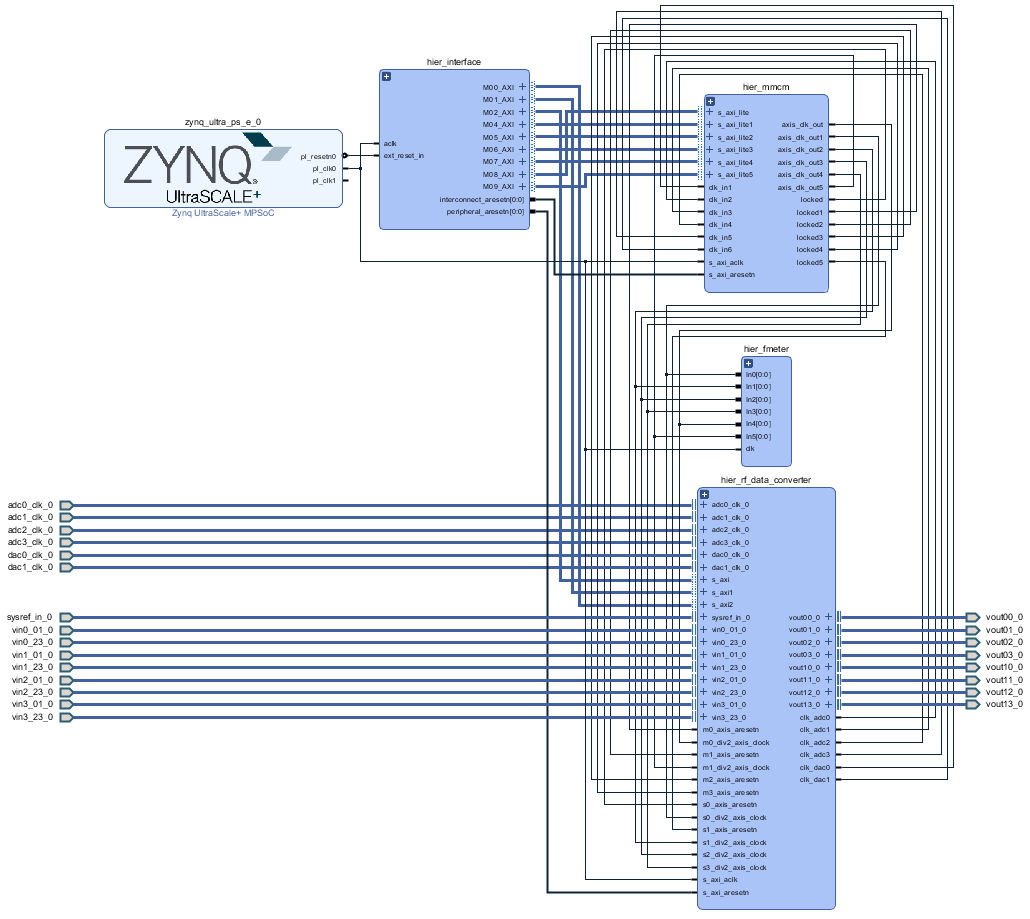 Image Removed Image Removed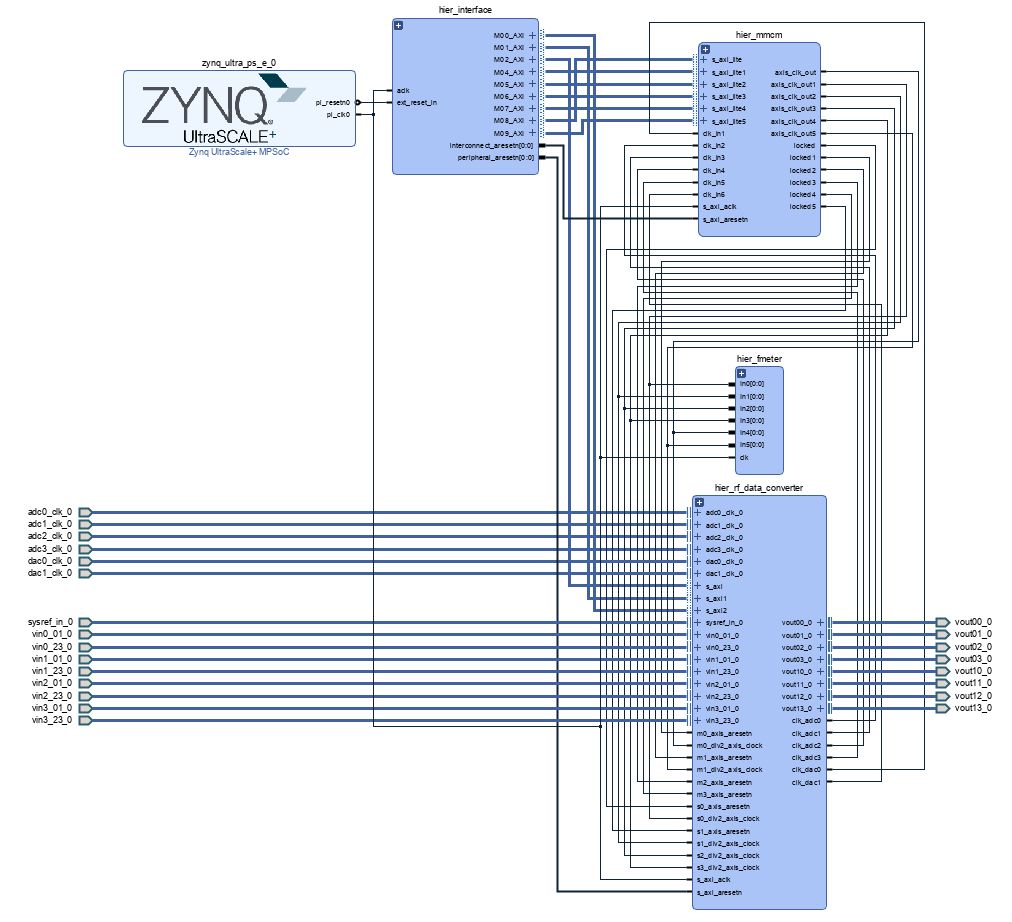 Image Added Image Added |
PS Interfaces
| Page properties | ||||
|---|---|---|---|---|
| ||||
Note:
|
Activated interfaces:
| Scroll Title | ||||||||||||||||||||||||||||||||||||||||||||
|---|---|---|---|---|---|---|---|---|---|---|---|---|---|---|---|---|---|---|---|---|---|---|---|---|---|---|---|---|---|---|---|---|---|---|---|---|---|---|---|---|---|---|---|---|
| ||||||||||||||||||||||||||||||||||||||||||||
|
Constrains
Basic module constrains
| Code Block | ||||
|---|---|---|---|---|
| ||||
set_property BITSTREAM.GENERAL.COMPRESS TRUE [current_design] set_property BITSTREAM.CONFIG.UNUSEDPIN PULLNONE [current_design] |
Design specific constrain
| Code Block | ||||
|---|---|---|---|---|
| ||||
set_false_path -from [get_pins -hier -filter {name=~*labtools_fmeter_0/U0/*/CLK}] -to [get_pins -hier -filter {name=~*labtools_fmeter_0/U0/F_reg[*]/D}]
set_false_path -from [get_pins -hier -filter {name=~*labtools_fmeter_0/U0/toggle_reg/C}] -to [get_pins -hier -filter {name=~*labtools_fmeter_0/U0/*/bl.DSP48E_2/*}]
set_false_path -from [get_pins -hier -filter {name=~*labtools_fmeter_0/U0/toggle_reg/C}] -to [get_pins -hier -filter {name=~*labtools_fmeter_0/U0/*/bl.DSP48E_2/DSP_A_B_DATA_INST/*}]
set_false_path -from [get_pins -hier -filter {name=~*labtools_fmeter_0/U0/toggle_reg/C}] -to [get_pins -hier -filter {name=~*labtools_fmeter_0/U0/*/bl.DSP48E_2/DSP_ALU_INST/*}]
set_false_path -from [get_pins -hier -filter {name=~*labtools_fmeter_0/U0/toggle_reg/C}] -to [get_pins -hier -filter {name=~*labtools_fmeter_0/U0/*/bl.DSP48E_2/DSP_OUTPUT_INST/*}]
set_false_path -from [get_pins -hier -filter {name=~*labtools_fmeter_0/U0/toggle_reg/C}] -to [get_pins -hier -filter {name=~*labtools_fmeter_0/U0/*/bl.DSP48E_2/DSP_C_DATA_INST/*}]
set_false_path -from [get_pins -hier -filter {name=~*labtools_fmeter_0/U0/FMETER_gen[4].COUNTER_F_inst/bl.DSP48E_2/DSP_ALU_INST/CLK}] -to [get_pins -hier -filter {name=~*labtools_fmeter_0/U0/FMETER_gen[4].COUNTER_F_inst/bl.DSP48E_2/DSP_OUTPUT_INST/*}]
set_false_path -from [get_pins -hier -filter {name=~*labtools_fmeter_0/U0/FMETER_gen[5].COUNTER_F_inst/bl.DSP48E_2/DSP_ALU_INST/CLK}] -to [get_pins -hier -filter {name=~*labtools_fmeter_0/U0/FMETER_gen[5].COUNTER_F_inst/bl.DSP48E_2/DSP_OUTPUT_INST/*}] |
| Code Block | ||||
|---|---|---|---|---|
| ||||
#----------------------------------------------------------------------
# Title : Example top level constraints for UltraScale+ RF Data Converter
#----------------------------------------------------------------------
# File : usp_rf_data_converter_0_example_design.xdc
#----------------------------------------------------------------------
# Description: Xilinx Constraint file for the example design for
# UltraScale+ RF Data Converter core
#---------------------------------------------------------------------
#
# DISCLAIMER
# This disclaimer is not a license and does not grant any
# rights to the materials distributed herewith. Except as
# otherwise provided in a valid license issued to you by
# Xilinx, and to the maximum extent permitted by applicable
# law: (1) THESE MATERIALS ARE MADE AVAILABLE "AS IS" AND
# WITH ALL FAULTS, AND XILINX HEREBY DISCLAIMS ALL WARRANTIES
# AND CONDITIONS, EXPRESS, IMPLIED, OR STATUTORY, INCLUDING
# BUT NOT LIMITED TO WARRANTIES OF MERCHANTABILITY, NON-
# INFRINGEMENT, OR FITNESS FOR ANY PARTICULAR PURPOSE; and
# (2) Xilinx shall not be liable (whether in contract or tort,
# including negligence, or under any other theory of
# liability) for any loss or damage of any kind or nature
# related to, arising under or in connection with these
# materials, including for any direct, or any indirect,
# special, incidental, or consequential loss or damage
# (including loss of data, profits, goodwill, or any type of
# loss or damage suffered as a result of any action brought
# by a third party) even if such damage or loss was
# reasonably foreseeable or Xilinx had been advised of the
# possibility of the same.
#
# CRITICAL APPLICATIONS
# Xilinx products are not designed or intended to be fail-
# safe, or for use in any application requiring fail-safe
# performance, such as life-support or safety devices or
# systems, Class III medical devices, nuclear facilities,
# applications related to the deployment of airbags, or any
# other applications that could lead to death, personal
# injury, or severe property or environmental damage
# (individually and collectively, "Critical
# Applications"). Customer assumes the sole risk and
# liability of any use of Xilinx products in Critical
# Applications, subject only to applicable laws and
# regulations governing limitations on product liability.
#
# THIS COPYRIGHT NOTICE AND DISCLAIMER MUST BE RETAINED AS
# PART OF THIS FILE AT ALL TIMES.
#
#---------------------------------------------------------------------
#------------------------------------------
# TIMING CONSTRAINTS
#------------------------------------------
# Set AXI-Lite Clock to 100MHz
#create_clock -period 10.000 -name usp_rf_data_converter_0_axi_aclk [get_pins axi_aclk_i/CFGMCLK]
# ADC Reference Clock for Tile 0 running at 245.760 MHz
create_clock -period 4.069 -name usp_rf_data_converter_0_adc0_clk [get_ports adc0_clk_p]
# ADC Reference Clock for Tile 1 running at 245.760 MHz
create_clock -period 4.069 -name usp_rf_data_converter_0_adc1_clk [get_ports adc1_clk_p]
# ADC Reference Clock for Tile 2 running at 245.760 MHz
create_clock -period 4.069 -name usp_rf_data_converter_0_adc2_clk [get_ports adc2_clk_p]
# ADC Reference Clock for Tile 3 running at 245.760 MHz
create_clock -period 4.069 -name usp_rf_data_converter_0_adc3_clk [get_ports adc3_clk_p]
# DAC Reference Clock for Tile 0 running at 307.200 MHz
create_clock -period 3.255 -name usp_rf_data_converter_0_dac0_clk [get_ports dac0_clk_p]
# DAC Reference Clock for Tile 1 running at 307.200 MHz
create_clock -period 3.255 -name usp_rf_data_converter_0_dac1_clk [get_ports dac1_clk_p]
set_multicycle_path -to [get_pins -filter {REF_PIN_NAME== D} -of [get_cells -hier -filter {name =~ *usp_rf_data_converter_0_ex_i/ex_design/usp_rf_data_converter_0/inst/IP2Bus_Data_reg*}]] -setup 2
set_multicycle_path -to [get_pins -filter {REF_PIN_NAME== D} -of [get_cells -hier -filter {name =~ *usp_rf_data_converter_0_ex_i/ex_design/usp_rf_data_converter_0/inst/IP2Bus_Data_reg*}]] -hold 1
###############################################################################
# False paths
# For debug in synth use
# report_timing_summary -setup -slack_lesser_than 0
###############################################################################
# Data generator/capture constraints
set rfa_from_list [get_cells -hier -regexp .*rf(?:da|ad)c_exdes_ctrl_i\/(?:da|ad)c_exdes_cfg_i\/.+num_samples_reg.*]
set rfa_dac_signal_list [get_cells -hier -filter {name=~*dg_slice_00*addrb_reg[*]}]
set_false_path -from $rfa_from_list -to $rfa_dac_signal_list
set rfa_dac_signal_list [get_cells -hier -filter {name=~*dg_slice_00*addrbend_reg}]
set_false_path -from $rfa_from_list -to $rfa_dac_signal_list
set rfa_dac_signal_list [get_cells -hier -filter {name=~*dg_slice_01*addrb_reg[*]}]
set_false_path -from $rfa_from_list -to $rfa_dac_signal_list
set rfa_dac_signal_list [get_cells -hier -filter {name=~*dg_slice_01*addrbend_reg}]
set_false_path -from $rfa_from_list -to $rfa_dac_signal_list
set rfa_dac_signal_list [get_cells -hier -filter {name=~*dg_slice_02*addrb_reg[*]}]
set_false_path -from $rfa_from_list -to $rfa_dac_signal_list
set rfa_dac_signal_list [get_cells -hier -filter {name=~*dg_slice_02*addrbend_reg}]
set_false_path -from $rfa_from_list -to $rfa_dac_signal_list
set rfa_dac_signal_list [get_cells -hier -filter {name=~*dg_slice_03*addrb_reg[*]}]
set_false_path -from $rfa_from_list -to $rfa_dac_signal_list
set rfa_dac_signal_list [get_cells -hier -filter {name=~*dg_slice_03*addrbend_reg}]
set_false_path -from $rfa_from_list -to $rfa_dac_signal_list
set rfa_dac_signal_list [get_cells -hier -filter {name=~*dg_slice_10*addrb_reg[*]}]
set_false_path -from $rfa_from_list -to $rfa_dac_signal_list
set rfa_dac_signal_list [get_cells -hier -filter {name=~*dg_slice_10*addrbend_reg}]
set_false_path -from $rfa_from_list -to $rfa_dac_signal_list
set rfa_dac_signal_list [get_cells -hier -filter {name=~*dg_slice_11*addrb_reg[*]}]
set_false_path -from $rfa_from_list -to $rfa_dac_signal_list
set rfa_dac_signal_list [get_cells -hier -filter {name=~*dg_slice_11*addrbend_reg}]
set_false_path -from $rfa_from_list -to $rfa_dac_signal_list
set rfa_dac_signal_list [get_cells -hier -filter {name=~*dg_slice_12*addrb_reg[*]}]
set_false_path -from $rfa_from_list -to $rfa_dac_signal_list
set rfa_dac_signal_list [get_cells -hier -filter {name=~*dg_slice_12*addrbend_reg}]
set_false_path -from $rfa_from_list -to $rfa_dac_signal_list
set rfa_dac_signal_list [get_cells -hier -filter {name=~*dg_slice_13*addrb_reg[*]}]
set_false_path -from $rfa_from_list -to $rfa_dac_signal_list
set rfa_dac_signal_list [get_cells -hier -filter {name=~*dg_slice_13*addrbend_reg}]
set_false_path -from $rfa_from_list -to $rfa_dac_signal_list
set rfa_from_list [get_cells -hier -regexp .*rf(?:da|ad)c_exdes_ctrl_i\/(?:da|ad)c_exdes_cfg_i\/.+num_samples_reg.*]
set rfa_adc_signal_list [get_cells -hier -filter {name=~*ds_slice_00*addra_reg[*]}]
set_false_path -from $rfa_from_list -to $rfa_adc_signal_list
set rfa_adc_signal_list [get_cells -hier -filter {name=~*ds_slice_00*working_i_reg}]
set_false_path -from $rfa_from_list -to $rfa_adc_signal_list
set rfa_adc_signal_list [get_cells -hier -filter {name=~*ds_slice_00*cap_complete_reg}]
set_false_path -from $rfa_from_list -to $rfa_adc_signal_list
set rfa_adc_signal_list [get_cells -hier -filter {name=~*ds_slice_00*wea_r_reg}]
set_false_path -from $rfa_from_list -to $rfa_adc_signal_list
set rfa_adc_signal_list [get_cells -hier -filter {name=~*ds_slice_01*addra_reg[*]}]
set_false_path -from $rfa_from_list -to $rfa_adc_signal_list
set rfa_adc_signal_list [get_cells -hier -filter {name=~*ds_slice_01*working_i_reg}]
set_false_path -from $rfa_from_list -to $rfa_adc_signal_list
set rfa_adc_signal_list [get_cells -hier -filter {name=~*ds_slice_01*cap_complete_reg}]
set_false_path -from $rfa_from_list -to $rfa_adc_signal_list
set rfa_adc_signal_list [get_cells -hier -filter {name=~*ds_slice_01*wea_r_reg}]
set_false_path -from $rfa_from_list -to $rfa_adc_signal_list
set rfa_adc_signal_list [get_cells -hier -filter {name=~*ds_slice_02*addra_reg[*]}]
set_false_path -from $rfa_from_list -to $rfa_adc_signal_list
set rfa_adc_signal_list [get_cells -hier -filter {name=~*ds_slice_02*working_i_reg}]
set_false_path -from $rfa_from_list -to $rfa_adc_signal_list
set rfa_adc_signal_list [get_cells -hier -filter {name=~*ds_slice_02*cap_complete_reg}]
set_false_path -from $rfa_from_list -to $rfa_adc_signal_list
set rfa_adc_signal_list [get_cells -hier -filter {name=~*ds_slice_02*wea_r_reg}]
set_false_path -from $rfa_from_list -to $rfa_adc_signal_list
set rfa_adc_signal_list [get_cells -hier -filter {name=~*ds_slice_03*addra_reg[*]}]
set_false_path -from $rfa_from_list -to $rfa_adc_signal_list
set rfa_adc_signal_list [get_cells -hier -filter {name=~*ds_slice_03*working_i_reg}]
set_false_path -from $rfa_from_list -to $rfa_adc_signal_list
set rfa_adc_signal_list [get_cells -hier -filter {name=~*ds_slice_03*cap_complete_reg}]
set_false_path -from $rfa_from_list -to $rfa_adc_signal_list
set rfa_adc_signal_list [get_cells -hier -filter {name=~*ds_slice_03*wea_r_reg}]
set_false_path -from $rfa_from_list -to $rfa_adc_signal_list
set rfa_adc_signal_list [get_cells -hier -filter {name=~*ds_slice_10*addra_reg[*]}]
set_false_path -from $rfa_from_list -to $rfa_adc_signal_list
set rfa_adc_signal_list [get_cells -hier -filter {name=~*ds_slice_10*working_i_reg}]
set_false_path -from $rfa_from_list -to $rfa_adc_signal_list
set rfa_adc_signal_list [get_cells -hier -filter {name=~*ds_slice_10*cap_complete_reg}]
set_false_path -from $rfa_from_list -to $rfa_adc_signal_list
set rfa_adc_signal_list [get_cells -hier -filter {name=~*ds_slice_10*wea_r_reg}]
set_false_path -from $rfa_from_list -to $rfa_adc_signal_list
set rfa_adc_signal_list [get_cells -hier -filter {name=~*ds_slice_11*addra_reg[*]}]
set_false_path -from $rfa_from_list -to $rfa_adc_signal_list
set rfa_adc_signal_list [get_cells -hier -filter {name=~*ds_slice_11*working_i_reg}]
set_false_path -from $rfa_from_list -to $rfa_adc_signal_list
set rfa_adc_signal_list [get_cells -hier -filter {name=~*ds_slice_11*cap_complete_reg}]
set_false_path -from $rfa_from_list -to $rfa_adc_signal_list
set rfa_adc_signal_list [get_cells -hier -filter {name=~*ds_slice_11*wea_r_reg}]
set_false_path -from $rfa_from_list -to $rfa_adc_signal_list
set rfa_adc_signal_list [get_cells -hier -filter {name=~*ds_slice_12*addra_reg[*]}]
set_false_path -from $rfa_from_list -to $rfa_adc_signal_list
set rfa_adc_signal_list [get_cells -hier -filter {name=~*ds_slice_12*working_i_reg}]
set_false_path -from $rfa_from_list -to $rfa_adc_signal_list
set rfa_adc_signal_list [get_cells -hier -filter {name=~*ds_slice_12*cap_complete_reg}]
set_false_path -from $rfa_from_list -to $rfa_adc_signal_list
set rfa_adc_signal_list [get_cells -hier -filter {name=~*ds_slice_12*wea_r_reg}]
set_false_path -from $rfa_from_list -to $rfa_adc_signal_list
set rfa_adc_signal_list [get_cells -hier -filter {name=~*ds_slice_13*addra_reg[*]}]
set_false_path -from $rfa_from_list -to $rfa_adc_signal_list
set rfa_adc_signal_list [get_cells -hier -filter {name=~*ds_slice_13*working_i_reg}]
set_false_path -from $rfa_from_list -to $rfa_adc_signal_list
set rfa_adc_signal_list [get_cells -hier -filter {name=~*ds_slice_13*cap_complete_reg}]
set_false_path -from $rfa_from_list -to $rfa_adc_signal_list
set rfa_adc_signal_list [get_cells -hier -filter {name=~*ds_slice_13*wea_r_reg}]
set_false_path -from $rfa_from_list -to $rfa_adc_signal_list
set rfa_adc_signal_list [get_cells -hier -filter {name=~*ds_slice_20*addra_reg[*]}]
set_false_path -from $rfa_from_list -to $rfa_adc_signal_list
set rfa_adc_signal_list [get_cells -hier -filter {name=~*ds_slice_20*working_i_reg}]
set_false_path -from $rfa_from_list -to $rfa_adc_signal_list
set rfa_adc_signal_list [get_cells -hier -filter {name=~*ds_slice_20*cap_complete_reg}]
set_false_path -from $rfa_from_list -to $rfa_adc_signal_list
set rfa_adc_signal_list [get_cells -hier -filter {name=~*ds_slice_20*wea_r_reg}]
set_false_path -from $rfa_from_list -to $rfa_adc_signal_list
set rfa_adc_signal_list [get_cells -hier -filter {name=~*ds_slice_21*addra_reg[*]}]
set_false_path -from $rfa_from_list -to $rfa_adc_signal_list
set rfa_adc_signal_list [get_cells -hier -filter {name=~*ds_slice_21*working_i_reg}]
set_false_path -from $rfa_from_list -to $rfa_adc_signal_list
set rfa_adc_signal_list [get_cells -hier -filter {name=~*ds_slice_21*cap_complete_reg}]
set_false_path -from $rfa_from_list -to $rfa_adc_signal_list
set rfa_adc_signal_list [get_cells -hier -filter {name=~*ds_slice_21*wea_r_reg}]
set_false_path -from $rfa_from_list -to $rfa_adc_signal_list
set rfa_adc_signal_list [get_cells -hier -filter {name=~*ds_slice_22*addra_reg[*]}]
set_false_path -from $rfa_from_list -to $rfa_adc_signal_list
set rfa_adc_signal_list [get_cells -hier -filter {name=~*ds_slice_22*working_i_reg}]
set_false_path -from $rfa_from_list -to $rfa_adc_signal_list
set rfa_adc_signal_list [get_cells -hier -filter {name=~*ds_slice_22*cap_complete_reg}]
set_false_path -from $rfa_from_list -to $rfa_adc_signal_list
set rfa_adc_signal_list [get_cells -hier -filter {name=~*ds_slice_22*wea_r_reg}]
set_false_path -from $rfa_from_list -to $rfa_adc_signal_list
set rfa_adc_signal_list [get_cells -hier -filter {name=~*ds_slice_23*addra_reg[*]}]
set_false_path -from $rfa_from_list -to $rfa_adc_signal_list
set rfa_adc_signal_list [get_cells -hier -filter {name=~*ds_slice_23*working_i_reg}]
set_false_path -from $rfa_from_list -to $rfa_adc_signal_list
set rfa_adc_signal_list [get_cells -hier -filter {name=~*ds_slice_23*cap_complete_reg}]
set_false_path -from $rfa_from_list -to $rfa_adc_signal_list
set rfa_adc_signal_list [get_cells -hier -filter {name=~*ds_slice_23*wea_r_reg}]
set_false_path -from $rfa_from_list -to $rfa_adc_signal_list
set rfa_adc_signal_list [get_cells -hier -filter {name=~*ds_slice_30*addra_reg[*]}]
set_false_path -from $rfa_from_list -to $rfa_adc_signal_list
set rfa_adc_signal_list [get_cells -hier -filter {name=~*ds_slice_30*working_i_reg}]
set_false_path -from $rfa_from_list -to $rfa_adc_signal_list
set rfa_adc_signal_list [get_cells -hier -filter {name=~*ds_slice_30*cap_complete_reg}]
set_false_path -from $rfa_from_list -to $rfa_adc_signal_list
set rfa_adc_signal_list [get_cells -hier -filter {name=~*ds_slice_30*wea_r_reg}]
set_false_path -from $rfa_from_list -to $rfa_adc_signal_list
set rfa_adc_signal_list [get_cells -hier -filter {name=~*ds_slice_31*addra_reg[*]}]
set_false_path -from $rfa_from_list -to $rfa_adc_signal_list
set rfa_adc_signal_list [get_cells -hier -filter {name=~*ds_slice_31*working_i_reg}]
set_false_path -from $rfa_from_list -to $rfa_adc_signal_list
set rfa_adc_signal_list [get_cells -hier -filter {name=~*ds_slice_31*cap_complete_reg}]
set_false_path -from $rfa_from_list -to $rfa_adc_signal_list
set rfa_adc_signal_list [get_cells -hier -filter {name=~*ds_slice_31*wea_r_reg}]
set_false_path -from $rfa_from_list -to $rfa_adc_signal_list
set rfa_adc_signal_list [get_cells -hier -filter {name=~*ds_slice_32*addra_reg[*]}]
set_false_path -from $rfa_from_list -to $rfa_adc_signal_list
set rfa_adc_signal_list [get_cells -hier -filter {name=~*ds_slice_32*working_i_reg}]
set_false_path -from $rfa_from_list -to $rfa_adc_signal_list
set rfa_adc_signal_list [get_cells -hier -filter {name=~*ds_slice_32*cap_complete_reg}]
set_false_path -from $rfa_from_list -to $rfa_adc_signal_list
set rfa_adc_signal_list [get_cells -hier -filter {name=~*ds_slice_32*wea_r_reg}]
set_false_path -from $rfa_from_list -to $rfa_adc_signal_list
set rfa_adc_signal_list [get_cells -hier -filter {name=~*ds_slice_33*addra_reg[*]}]
set_false_path -from $rfa_from_list -to $rfa_adc_signal_list
set rfa_adc_signal_list [get_cells -hier -filter {name=~*ds_slice_33*working_i_reg}]
set_false_path -from $rfa_from_list -to $rfa_adc_signal_list
set rfa_adc_signal_list [get_cells -hier -filter {name=~*ds_slice_33*cap_complete_reg}]
set_false_path -from $rfa_from_list -to $rfa_adc_signal_list
set rfa_adc_signal_list [get_cells -hier -filter {name=~*ds_slice_33*wea_r_reg}]
set_false_path -from $rfa_from_list -to $rfa_adc_signal_list
|
-from $rfa_from_list -to $rfa_adc_signal_list
|
Software Design - Vitis
| Scroll Ignore | ||||||||||||||
|---|---|---|---|---|---|---|---|---|---|---|---|---|---|---|
| ||||||||||||||
| Page properties | ||||
|---|---|---|---|---|
| ||||
Note:
|
For SDK project creation, follow instructions from:
Application
| Page properties | ||||
|---|---|---|---|---|
| ||||
---------------------------------------------------------- FPGA Example scuMCS Firmware to configure SI5338 and Reset System. srec_spi_bootloaderTE modified 20192020.2 SREC Bootloader to load app or second bootloader from flash into DDR Descriptions:
xilisf_v5_11TE modified 20192020.2 xilisf_v5_11
---------------------------------------------------------- Zynq Example: zynq_fsblTE modified 20192020.2 FSBL General:
Module Specific:
fsbl_flashTE modified 20192020.2 FSBL General:
ZynqMP Example: ---------------------------------------------------------- zynqmp_fsblTE modified 20192020.2 FSBL General:
Module Specific:
zynqmp_fsbl_flashTE modified 20192020.2 FSBL General:
zynqmp_pmufwXilinx default PMU firmware. ---------------------------------------------------------- General Example: hello_te0820Hello TE0820 is a Xilinx Hello World example as endless loop instead of one console output. u-bootU-Boot.elf is generated with PetaLinux. Vitis Vitis is used to generate Boot.bin. |
Template location: ./sw_lib/sw_apps/
zynqmp_fsbl
TE modified 20192020.2 FSBL
General:
- Modified Files: xfsbl_main.c, xfsbl_hooks.h/.c, xfsbl_board.h/.c(search for 'TE Mod' on source code)
- Add Files: te_*xfsbl_hooks.h/.c (for hooks and board)
- General Changes:
- Display FSBL Banner and Device Name
Module Specific:
- Add Files: all TE Files start with te_*
- Si5395 on the TE0835 RFSoC module configuration
- Si5395 on the TEB0835 carrier board configuration
zynqmp_fsbl_flash
TE modified 20192020.2 FSBL
General:
- Modified Files: xfsbl_initialisation.c, xfsbl_hw.h, xfsbl_handoff.c, xfsbl_main.c
- General Changes:
- Display FSBL Banner
- Set FSBL Boot Mode to JTAG
- Disable Memory initialisation
zynqmp_pmufw
Xilinx default PMU firmware.
hello_te0835
Hello TE0835 is a Xilinx Hello World example as endless loop instead of one console output.
u-boot
U-Boot.elf is generated with PetaLinux. Vitis is used to generate Boot.bin.
Software Design - PetaLinuxBoot.bin.
Software Design - PetaLinux
| Scroll Ignore | ||||||||||||||
|---|---|---|---|---|---|---|---|---|---|---|---|---|---|---|
| ||||||||||||||
| Page properties | ||||
|---|---|---|---|---|
| ||||
Note:
|
For PetaLinux installation and project creation, follow instructions from:
Config
Start with petalinux-config or petalinux-config --get-hw-description
Changes:
- CONFIG_SUBSYSTEM_ETHERNET_PSU_ETHERNET_3_MAC=""
U-Boot
Start with petalinux-config -c u-boot
Changes:
CONFIG_ENV_IS_NOWHERE=y
# CONFIG_ENV_IS_IN_SPI_FLASH is not set
CONFIG_I2C_EEPROM=y
CONFIG_ZYNQ_GEM_I2C_MAC_OFFSET=0xFA
CONFIG_SYS_I2C_EEPROM_ADDR=0
CONFIG_SYS_I2C_EEPROM_BUS=0
CONFIG_SYS_EEPROM_SIZE=256
CONFIG_SYS_EEPROM_PAGE_WRITE_BITS=0
CONFIG_SYS_EEPROM_PAGE_WRITE_DELAY_MS=0
CONFIG_SYS_I2C_EEPROM_ADDR_LEN=1
CONFIG_SYS_I2C_EEPROM_ADDR_OVERFLOW=0
Change platform-top.h:
| Code Block | ||
|---|---|---|
| ||
Device Tree
| Code Block | ||
|---|---|---|
| ||
/include/ "system-conf.dtsi"
/ {
chosen {
xlnx,eeprom = &eeprom;
};
};
/* SDIO */
&sdhci1 {
disable-wp;
no-1-8-v;
};
/* ETH PHY */
&gem3 {
status = "okay";
ethernet_phy0: ethernet-phy@0 {
compatible = "marvell,88e1510";
device_type = "ethernet-phy";
reg = <1>;
};
};
/* USB 2.0 */
/* USB */
&dwc3_0 {
status = "okay";
dr_mode = "host";
maximum-speed = "high-speed";
/delete-property/phy-names;
/delete-property/phys;
/delete-property/snps,usb3_lpm_capable;
snps,dis_u2_susphy_quirk;
snps,dis_u3_susphy_quirk;
};
&usb0 {
status = "okay";
/delete-property/ clocks;
/delete-property/ clock-names;
clocks = <0x3 0x20>;
clock-names = "bus_clk";
};
/* QSPI PHY */
&qspi {
#address-cells = <1>;
#size-cells = <0>;
status = "okay";
flash0: flash@0 {
compatible = "jedec,spi-nor";
reg = <0x0>;
#address-cells = <1>;
#size-cells = <1>;
};
};
// This I2C Port can be found in the RFSoC Module TE0835 to control PLL chip SI5395A-A-GM on the
// RFSoC Module.
&i2c1 {
eeprom: eeprom@50 {
compatible = "atmel,24c08";
reg = <0x50>;
};
};
// This I2C Port connects RFSoC FPGA on the RFSoC Module and I2C multiplexer Chip on the carrier
// board through B2B connector.
&i2c0 {
// This I2C multiplexer chip can be found in TEB0835 carrier board.
i2c_mux@70 { /* TCA9544APWR U7 in the carrier board TEB0835 */
compatible = "nxp,pca9544";
#address-cells = <1>;
#size-cells = <0>;
reg = <0x70>;
i2c@0 { /* FireFly_B*/
#address-cells = <1>;
#size-cells = <0>;
reg = <0>;
};
i2c@1 { /* FireFly_A*/
#address-cells = <1>;
#size-cells = <0>;
reg = <1>;
};
i2c@3 { /* LM96163CISD/NOPB U9 FAN Controller in the carrier board TEB0835*/
#address-cells = <1>;
#size-cells = <0>;
reg = <3>;
temp@4c {/* lm96163 - u9*/
compatible = "national,lm96163";
reg = <0x4c>;
};
};
i2c@4 { /* SI5395A-A-GM U5 DPLL in the carrier board TEB0835*/
#address-cells = <1>;
#size-cells = <0>;
reg = <4>;
clock-generator@68{/* SI5395A-A-GM U5 DPLL in the carrier board TEB0835 */
compatible = "silabs,si5395";
reg = <0x68>;
};
};
};
};
|
FSBL patch
Must be add manually, see template
Kernel
Start with petalinux-config -c kernel
Changes:
CONFIG_CPU_IDLE is not set (only needed to fix JTAG Debug issue)
CONFIG_CPU_FREQ is not set (only needed to fix JTAG Debug issue)
- CONFIG_EDAC_CORTEX_ARM64=y
Rootfs
Start with petalinux-config -c rootfs
Changes:
- CONFIG_i2c-tools=y
- CONFIG_busybox-httpd=y (for web server app)
- CONFIG_packagegroup-petalinux-utils(util-linux,cpufrequtils,bridge-utils,mtd-utils,usbutils,pciutils,canutils,i2c-tools,smartmontools,e2fsprogs)
Applications
See: "<project folder>\os\petalinux\project-spec\meta-user\recipes-apps\"
startup
Script App to load init.sh from SD Card if available.
webfwu
Webserver application accemble for Zynqmp RFSoC access. Need busybox-httpd
Additional Software
| Scroll Ignore | ||||||||||||||
|---|---|---|---|---|---|---|---|---|---|---|---|---|---|---|
| ||||||||||||||
| Page properties | ||||
|---|---|---|---|---|
| ||||
| Note: |
No additional software is needed.
SI5395 of RFSoC module
File location <design name>/misc/Si5395/Si5395-*-835-*.slabtimeproj
General documentation how you work with these project will be available on Si5395
SI5395 of carrier board
File location <design name>/misc/Si5395/Si5395-*-B835-*.slabtimeproj
General documentation how you work with these project will be available on Si5395
Appx. A: Change History and Legal Noticeswith these project will be available on Si5395
Appx. A: Change History and Legal Notices
| Scroll Ignore | ||||||||||||||
|---|---|---|---|---|---|---|---|---|---|---|---|---|---|---|
| ||||||||||||||
Document Change History
To get content of older revision got to "Change History" of this page and select older document revision number.
| Page properties | ||||
|---|---|---|---|---|
| ||||
|
| Scroll Title | ||||||||||||||||||||||||||||||||||||||||||||||||||||||||||||||||||||
|---|---|---|---|---|---|---|---|---|---|---|---|---|---|---|---|---|---|---|---|---|---|---|---|---|---|---|---|---|---|---|---|---|---|---|---|---|---|---|---|---|---|---|---|---|---|---|---|---|---|---|---|---|---|---|---|---|---|---|---|---|---|---|---|---|---|---|---|---|
| ||||||||||||||||||||||||||||||||||||||||||||||||||||||||||||||||||||
|
Legal Notices
| Include Page | ||||
|---|---|---|---|---|
|
| Scroll Only | ||||||||||||||
|---|---|---|---|---|---|---|---|---|---|---|---|---|---|---|
| ||||||||||||||
|
| Scroll pdf ignore | ||||||
|---|---|---|---|---|---|---|
| ||||||
|
